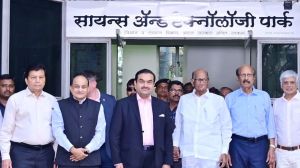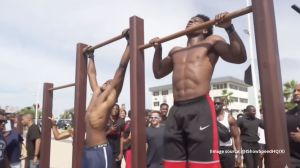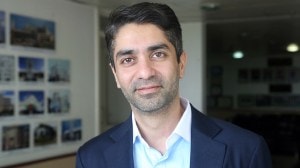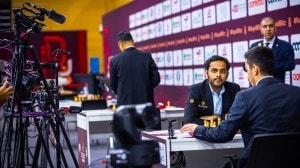Cake,chuckles and Cricket
Outside my window,the sky speaks of change and the coming of autumn as the wind soughs through the trees of the South Downs,45 miles south of London.
A 54-year-old radio show that gets cake from the Queen,and smiles from cricket lovers every time it comes on air. The BBCs Test Match Special is an institution as British as cricket at Lords
Outside my window,the sky speaks of change and the coming of autumn as the wind soughs through the trees of the South Downs,45 miles south of London. The Sunday newspapers are strewn across the kitchen table,the kettle has boiled for a mid-afternoon cup of tea and it only needs a slice of fruit-cake to complete a very English scene.
In the background,the radio is playing,not church hymns or Sir Edward Elgar compositions,but Test Match Special and the dulcet tones of Christopher Martin-Jenkins,a BBC cricket commentator who is giving ball-by-ball commentary on the Fourth Test between England and India.
Things aren8217;t going so well for India. It8217;s the fourth day of the Test and the team has been dismissed for 300 runs,291 behind Englands huge first innings score of 591. The teams have gone off for tea,and India need to bat for at least four sessions to prevent losing the series 4-0.
Martin-Jenkins and his guest summariser Sourav Ganguly are discussing the steadfast qualities of Rahul Dravid who has just carried his bat for India8217;s innings. For the rest of the afternoon,a succession of cricketing legends such as Michael Vaughan,Geoff Boycott and Sunil Gavaskar will be behind the microphone until stumps.
The BBCs Test Match Special is an institution and a much-loved national treasure. It is hugely popular in the UK and around the world and has an old-fashioned nature that has persisted for more than 50 years. Its attraction isn8217;t limited to cricket lovers. It also has a huge audience of housewives,who love the banter between the presenters,and some of whom even send in cakes.
Silver-tongued Henry Blofeld,affectionately known as Blowers,has been on the show for more than four decades and is known for his colourful and unorthodox style of commentating. He regularly throws in excited comments about pigeons,butterflies,helicopters and his favourite subject buses,especially the double-decker red buses that used to ply outside the Lord8217;s cricket ground. He also loves to chat with the rest of the Test Match Special team about which cakes theyre eating and which listener has sent them in. They are especially proud about a cake Her Royal Highness Queen Elizabeth once gifted them. It was terribly gooey,he says.
When I spoke to him,he was on his way to board a boat after a long lunch and was happy to relate anecdotes. He is 72 years old and still going strong,and while he wasn8217;t commentating on the final Test against India,he was looking forward to going to Abu Dhabi in the winter for Englands forthcoming Tests against Pakistan.
Blofeld was a first-class cricketer who made a century for Cambridge University and even scored two centuries at Lord8217;s until disaster struck. My bicycle and I went under a bus and I spent 28 days unconscious. I had 15 brain operations and my cricket was never the same after that day, he says. That misfortune was the BBCs gain. He goes on to say that the show8217;s appeal endures not only because of cricket,but because the Test Match Special team talks about other things apart from the game. First and foremost,all of us on the programme are encouraged to laugh as much as possible. We talk during the lunch break,the tea break and,of course,the rain-breaks. It is a little bit like an unscripted chat show and is as amusing to us as we hope it is to our listeners, he says.
Some of this amusement is legendary. In 1991,Brian Johnston and Jonathan Agnew were the presenters in the commentary box. Johnston was a charismatic figure and a fixture at the show for 27 years while Agnew Aggers was a journeyman cricketer who still presents the show.
Aggers made an ill-advised reference to Ian Bothams dismissal of hit wicket and for two minutes Johnston attempted to describe the closing of the England innings while chiding his colleague. Aggers,do stop it and Aggers,for goodness sake,stop it punctuated the conversation until the two of them collapsed in a fit of giggles. It is regularly voted by listeners as one of the funniest moments on UK radio.
Behind the laughter and the irreverence of the show,Test Match Special has a legacy that no other broadcaster can match. While live cricket had been broadcast on BBC Radio since 1927,it wasn8217;t until the visit of the Indian tourists in 1946 that a Test Match first featured regular commentary. Eleven years later,Test Match Special was launched and the West Indian tour of 1957 was the first series where every ball of a Test match was covered.
In the ensuing 50 years,the British public fell in love with a succession of extraordinary commentators and characters who presented the show. Brian Johnston was a natural showman who worked in tandem with the poetic John Arlott to relay their love of the game to a captive audience. They were complemented by England bowling legend Fred Trueman and Trevor Bailey who worked together for 26 years and are the ones that I especially remember as a child.
When England toured Australia I would take the radio to bed,turning it on during the night to hear the sound of cicadas and be reminded of sunny beaches and warm sunsets while I knew I would be going to school the next morning in an English winter. I did the same earlier this year when England retained the Ashes in Australia.
Over the years,Test Match Special has changed with the times and in 1998 in Trinidad,it finally employed its first female commentator,Barbadian Donna Symmonds. India has also been well represented over the years. Sunil Gavaskar is a regular contributor while commentators and guests have included Farokh Engineer,Ravi Shastri,Harsha Bhogle and even the Maharajah of Baroda. This week at the Oval for the 4th Test,even UK Prime Minister David Cameron was part of the show.
But there are idiosyncrasies that both delight and frustrate as well as emphasise the peculiar nature of a very English show. Listeners in the UK can listen to the show on Radio Five Sports Extra,but outside the UK it is heard on Radio Four on the 198 LW long wave frequency. For reasons that can only be known to the BBC,the commentary is regularly interrupted by a shipping forecast from around the seas of the British Isles,an inconvenience that drives many cricket fans to distraction.
The last word should go to Blofeld. He has fond memories of this newspaper when he came to India in 1963-64 with the Test Match Special team. Ah,yes,old thing,I remember the Indian Express. When I was there in the Sixties there was a terrible to-do with Tibet and China. I remember the newspaper putting a headline,in 28.5 bold,across eight columns. It said Chinese General flies back to front. Back to front,I8217;ve always loved that, he says as he chuckles down the phone.
I8217;m still laughing as I put down the phone and pick up my cup of tea. Today8217;s great English Sunday may almost be over,but Test Match Special has a long way to go.
Monty Munford is a writer based in England
- 01
- 02
- 03
- 04
- 05































